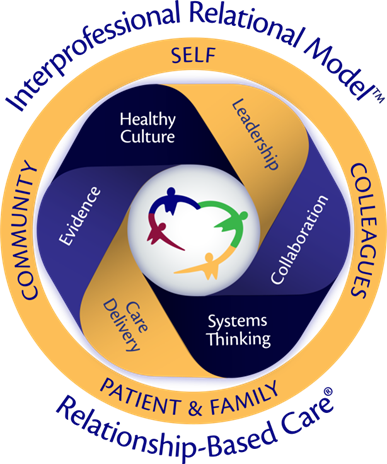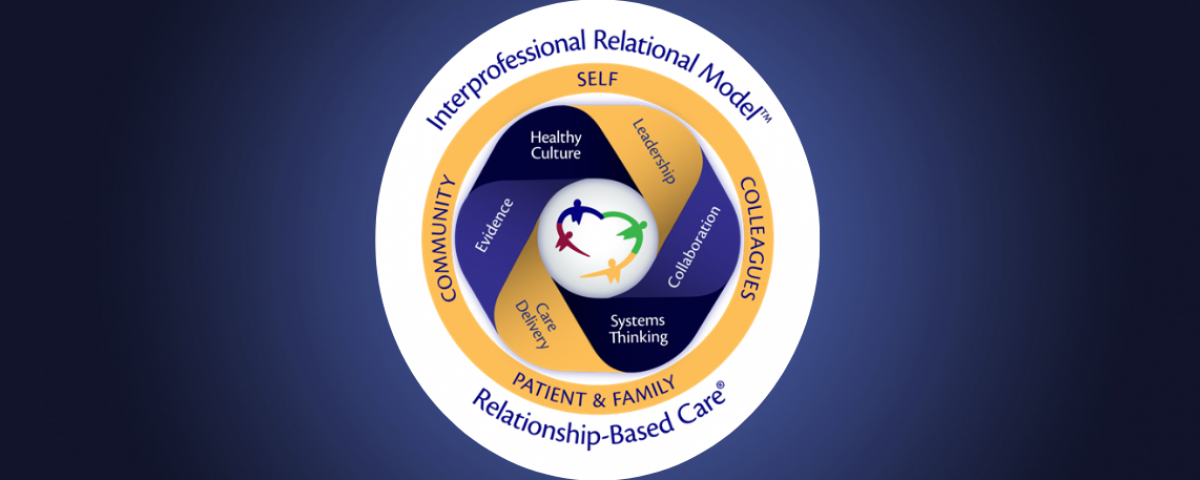Honoring the Legacy of Relationship-Based Care®
More than 20 years ago, Creative Health Care Management introduced Relationship-Based Care: A Model for Transforming Practice, often referred to simply as the Relationship-Based Care® book. This groundbreaking work described a model for care delivery and provided a transformational framework for how we lead, collaborate, and connect in health care.
At its heart, Relationship-Based Care (RBC) positioned relationships, beginning with self, as the foundation for healing and excellence. It asks us to understand our accountability to self: being aware of who we are, how we manage our energy, and caring for ourselves with the same love and compassion we show to others. This personal work allows us to show up as the best version of ourselves and be the supportive colleagues our teams need- so that together, we can deliver the excellence in care our patients and families deserve.
The three sacred relationships, beginning with the relationship with self, are central to healing, helping team members across the care continuum reconnect with meaning, purpose, and the humanity of their work.
The Global Impact of Relationship-Based Care®
Since its introduction, Relationship-Based Care has been widely adopted around the world, improving patient safety, quality of care, and the lived experience of both patients and caregivers. Over time in the ever-changing health care landscape, the model has naturally evolved- giving rise to the Interprofessional Relational Model (IRM)™.

The Interprofessional Relational Model™: Expanding the Vision
The Interprofessional Relational Model honors the core values of Relationship-Based Care while expanding them. It recognizes that relational care is not the sole responsibility of nurses or any single discipline. Instead, relational care is a shared commitment across all roles in health care, from frontline clinicians to environmental services, therapists to executives, and community partners.
Healing today is the work of many hands, hearts, and minds, working together.
The Key Relationships
At the heart of the Interprofessional Relational Model are the three foundational relationships of Relationship-Based Care, with the recognition of a fourth key relationship, community, necessary to sustain a caring culture:
- With Self – The foundation of relational capacity, built on self-awareness, resilience, and personal well-being.
- With Colleagues – Where mutual respect, trust, and psychological safety fuel healthy teamwork.
- With Patients and Families – Where empathy, presence, and individualized care shape therapeutic connections.
- With Community – Where responsibility extends beyond the bedside to advance equity, public health, and trust.
The Essentials: A Roadmap for Relational Practice
Supporting these relationships are six Essentials- a contemporary evolution of Relationship-Based Care’s original dimensions- that guide organizations in embedding relational practice system-wide:
- Leadership – Anyone can lead with integrity, vision, and relational intelligence, regardless of title.
- Systems Thinking – Policies and workflows are intentionally designed to reflect Interprofessional Relational Values.
- Care Delivery – All care, in every setting, is grounded in what matters most to each person we serve.
- Evidence – Both data and stories are honored as sources of insight and improvement.
- Collaboration – Effective, equitable partnerships span disciplines, departments, and communities.
- Healthy Culture – Dignity, belonging, and shared purpose are nurtured, and the organization’s mission is lived through shared values.
Together, these Essentials give organizations the structure and language to cultivate a truly relational culture- one where people feel seen, heard, and supported.
Why The Interprofessional Relational Model™ Matters in Today’s Health Care
The Interprofessional Relational Model embraces the concepts of Relationship-Based Care, strengthening and expanding them, while offering a modernized, scalable framework for today’s complex health care environment.
Whether you’re just beginning your journey or building on decades of cultural transformation, the Interprofessional Relational Model invites all of us to reimagine what’s possible when relationships are not an afterthought, but the foundation of everything we do.
At its core, the Interprofessional Relational Model is about team members cultivating healthy connections, with themselves, their colleagues, patients and families, and the broader community. When we commit to caring for one another across roles, disciplines, and settings, we don’t just improve outcomes- we restore the heart of health care.

Call to Action
If your organization is ready to embrace the evolution of Relationship-Based Care into the Interprofessional Relational Model- strengthening culture, improving patient outcomes, and fostering collaboration across every level of care- Creative Health Care Management can guide you.
NOW AVAILABLE: Our brand-new book, Essentials of a Caring Culture: The Interprofessional Relational Model™ delves deeper into this transformational journey, offering practical strategies, real-world examples, and inspiration for every health care role.
Schedule a consultation today to discover how this proven, modernized framework can transform your team and results- and be among the first to explore the insights in our upcoming book.
Kathleen Van Wagoner MSN, RN, MSA
Kathleen is an accomplished mentor and developer of people, programs, and culture. As a highly successful former nurse executive in clinical administration, program design, and project management, she is skilled in all aspects of care provision. She brings to her consulting work an in-depth knowledge of clinical operations, academics, research, and health care finance. She is dedicated to establishing high quality, caring relationships between health care providers and the patients and families in their care.


